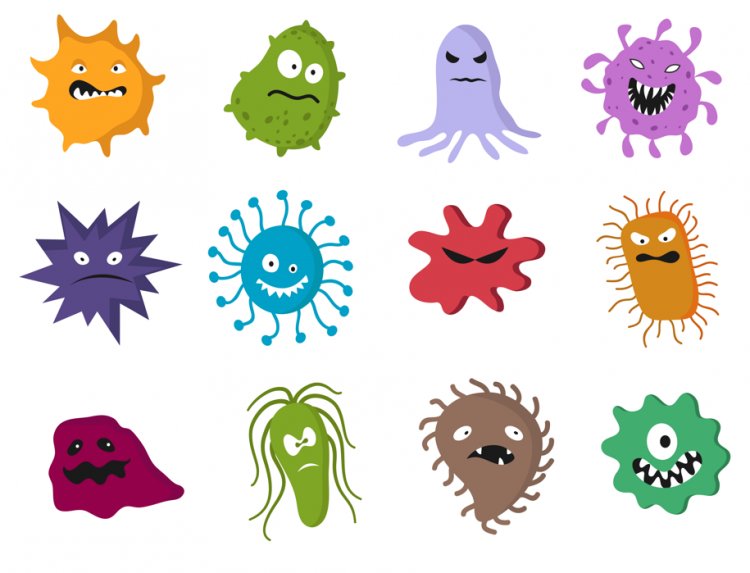The Hidden World of Parasites: Symptoms, Diagnosis, and Treatments
Parasites are organisms that live on or inside a host organism, deriving nutrients and protection at the host's expense. Parasites can cause a wide range of health problems, from mild discomfort to serious diseases. They are classified into three main categories: protozoa, helminths, and ectoparasites. Understanding the nature, symptoms, diagnostic methods, and treatments of parasitic infections is crucial for effective management and prevention.

Types of Parasites
Protozoa
Single-celled organisms that can multiply within the host.
Examples:
- Giardia lamblia: Causes giardiasis, leading to gastrointestinal symptoms.
- Plasmodium spp.: Causes malaria, characterized by fever, chills, and anemia.
- Entamoeba histolytica: Causes amoebiasis, resulting in dysentery and liver abscesses.
Helminths
Multicellular organisms, often referred to as worms.
Examples:
- Ascaris lumbricoides: A type of roundworm causing ascariasis, leading to intestinal blockage and malnutrition.
- Trichuris trichiura: Also known as whipworm, causes trichuriasis, leading to abdominal pain and diarrhea.
- Schistosoma spp.: Blood flukes causing schistosomiasis, resulting in liver damage and urinary issues.
Ectoparasites
Parasites that live on the surface of the host.
Examples:
- Pediculus humanus capitis: Head lice, causing itching and scalp irritation.
- Sarcoptes scabiei: Causes scabies, resulting in intense itching and rash.
- Ctenocephalides spp.: Fleas, which can transmit other diseases like typhus.
Symptoms
Symptoms of parasitic infections vary widely depending on the type of parasite and the organs affected. Common symptoms include:
Gastrointestinal Symptoms
- Nausea, vomiting, diarrhea, abdominal pain, bloating, and gas.
- Common in infections by Giardia, Entamoeba, and helminths like Ascaris.
Fatigue and Weakness
- Chronic fatigue, weakness, and general malaise.
- Often seen in malaria and other systemic infections.
Skin Conditions
- Rashes, itching, and sores.
- Common with ectoparasites like lice and mites, as well as skin-invading larvae such as Ancylostoma (hookworms).
Weight Loss
- Unexplained weight loss due to nutrient absorption by the parasite.
- Seen in tapeworm infections and chronic protozoan infections.
Respiratory Issues
- Coughing, wheezing, and shortness of breath.
- Can result from parasites like Ascaris and Strongyloides that migrate through the lungs.
Fever and Chills
- Common with systemic infections, particularly malaria.
Diagnosis
Diagnosing parasitic infections involves several steps:
Medical History and Symptoms
- A detailed medical history and symptom report provide initial clues, including travel history to endemic areas.
Stool Tests
- Microscopic examination of stool samples can identify eggs, larvae, or cysts of intestinal parasites like Giardia, Entamoeba, and helminths.
Blood Tests
- Blood samples can detect antibodies or antigens related to parasitic infections.
- Examples:
- Plasmodium antigen tests for malaria.
- Serological tests for Toxoplasma gondii.
Imaging
- Imaging techniques like X-rays, MRIs, or ultrasounds can identify larger parasites or organ damage.
- Examples:
- Ultrasound for hydatid cysts caused by Echinococcus.
- X-rays for lung involvement in Ascaris infections.
Biopsy
- In some cases, a tissue biopsy may be necessary to detect parasites embedded in tissues.
- Examples:
- Muscle biopsy for trichinosis caused by Trichinella spiralis.
- Liver biopsy for amoebic liver abscess.
Treatments
Treatment depends on the type of parasite and the severity of the infection:
Antiparasitic Medications
- Specific drugs target different parasites.
Protozoa:
- Metronidazole or tinidazole for Giardia and Entamoeba infections.
- Chloroquine, artemisinin-based combination therapies (ACTs) for malaria.
Helminths:
- Mebendazole or albendazole for roundworms, hookworms, and whipworms.
- Praziquantel for schistosomiasis and tapeworms.
Ectoparasites:
- Permethrin or ivermectin for lice and scabies.
Supportive Care
- Managing symptoms such as dehydration from diarrhea or pain relief is crucial.
- Oral rehydration solutions for severe diarrhea.
Surgical Intervention
- In severe cases, surgery might be necessary to remove parasitic cysts or repair damage.
- Examples:
- Surgical removal of hydatid cysts caused by Echinococcus.
- Drainage of abscesses in amoebiasis.
Preventive Measures
- Good hygiene practices, safe food and water consumption, and using insect repellent to avoid bites from vectors like mosquitoes.
- Examples:
- Boiling or filtering water to prevent giardiasis.
- Sleeping under insecticide-treated bed nets to prevent malaria.
- Proper cooking of meat to avoid trichinosis.
Parasitic infections remain a significant global health challenge, especially in tropical and subtropical regions. Comprehensive understanding and awareness of the types, symptoms, diagnostic methods, and treatments of parasitic infections are vital for effective management and prevention. Advances in medical research and public health strategies have significantly improved the control and treatment of many parasitic diseases, reducing their impact on affected populations. However, continued efforts in education, sanitation, and healthcare are essential to combat these infections effectively.
Disclaimer
The information provided in this article is for educational purposes only and should not be considered medical advice. If you have any health concerns or are experiencing symptoms, it is important to consult with a healthcare professional, such as a doctor or clinic, for proper diagnosis and treatment. Always seek the advice of your doctor or other qualified health provider with any questions you may have regarding a medical condition. Do not disregard professional medical advice or delay in seeking it because of something you have read in this article.
Hashtags
#parasites #health #medicaladvice #hygiene #infections #treatment #prevention #awareness #globalhealth
What's Your Reaction?





















